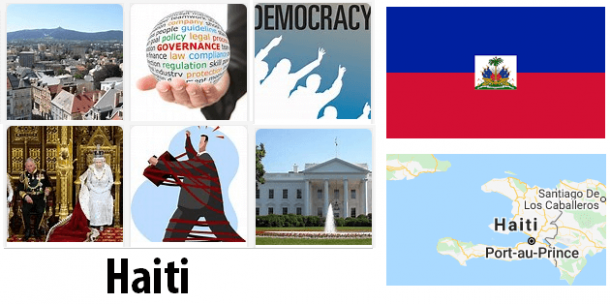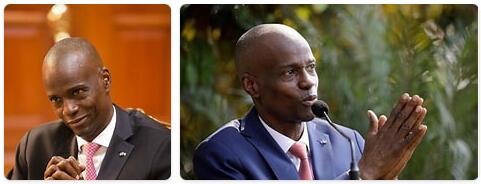Haiti Government and Politics
State and politics

The latest constitution of the Republic of Haiti has been in effect since June 2012 and is heavily influenced by the state of the US and France with great power for the presidency. The president is elected for five years and cannot be re-elected directly. The President appoints the Prime Minister, who must be approved by both chambers of Parliament. The Senate has 30 members and the Chamber of Deputies has 119 seats. All citizens over the age of 18 have the right to vote.
Haiti was ruled in 1957–71 by François Duvalier, who in 1964 was elected president for life. In this capacity he was succeeded by his son Jean-Claude Duvalier, who in 1986 was forced into exile, carrying a large part of Haiti’s foreign exchange reserve. The Duvalier family’s regime was characterized by severe oppression and economic exhaustion. The resistance was represented, among other things, by radical groups within the Catholic Church in Haiti. From 1986 to 1990, the country was ruled by changing military dictators.
It was not until 1990 that a constitutional, democratic presidential election could be held in the presence of UN observers. By a large majority, the priest Jean-Bertrand Aristide, representative of the so-called liberation theology, prevailed. After his supporters won the next parliamentary election, he took office in 1991 but was toppled in a coup later that year, leading to a US-led military intervention in 1994.
Since then, political instability has characterized the country, with several armed uprisings, coups and short-lived governments. After several years of political chaos, elections to Parliament and the presidential post were held in August and October 2015. Both elections were surrounded by allegations of electoral fraud and unrest, and the parliamentary elections required re-election in some constituencies.
The presidential election was postponed on several occasions and was not held until November 2016, which may be partly explained by a politically unstable situation and by Hurricane Matthew, which hit the country in the fall of 2016 and caused widespread devastation.
Candidate Jovenel Moïse, a party colleague of former President Michel Martelly, immediately declared the winner the winner after the election, but without being recognized by the opposition. Only after the Electoral Court in January 2017 determined the preliminary result, which meant that Moïse received close to 56 percent of the votes and thus won already in the first round, Moïse could take office on February 7, 2017.
See also History.
Judiciary
The legal system in Haiti is traditionally based on French law, including Code civil. The highest court is the Cassation Court, under which sort appellate courts and local courts. The judiciary is considered highly ineffective due to corruption and public dissolution. The death penalty was abolished in 1987; the last known execution took place in 1972.
Human Rights
Several factors cause the former colony and Latin America’s poorest country Haiti today to face major human rights problems. Centuries of economic, political and social difficulties as well as several devastating natural disasters (see History) have left the country with chronic poverty and widespread corruption.
About four-fifths of the population lives in absolute poverty and as many as three-fifths of the population are unemployed or underemployed. The health care deficiencies are large and a cholera epidemic in the 2010s has reaped many deaths.
The judiciary in the country is ineffective, and although the constitution requires an independent judiciary, the government affects all levels of the judicial system. Prisoners are often forced to wait a long time for trial and many accused criminals buy their freedom with bribes.
In Haiti, the media landscape is polarized between loyalists and critics. The government is showing hostility towards independent and critical media, leading to self-censorship. Accusations of slander and the fact that violence against journalists are not investigated particularly well by the police reinforce this. In Reporters Without Borders Press Freedom Index for 2015, Haiti ranked 53 out of 180.
Haiti has major problems with violence. Violence also affects politicians and government officials.
Hundreds of thousands of people have been living in tent camps since the 2010 earthquake. Children and women are extremely vulnerable to violence and sexual abuse in both the camps and the rest of society. Trade in girls and women is extensive.
The use of children in domestic work is extensive despite efforts by the authorities to stop this. The majority are girls from poor families who are sent to live with wealthier families in the hope that they will have a better life in exchange for performing easier tasks. These children are often at risk of being exploited and later left on the street. The problem with street children is great and has become greater after the natural disasters that led to an increasing number of children becoming orphans. The street children are vulnerable to sexual exploitation and often end up in the hands of criminal gangs.
Heads of State (in sample)
| Emperor | |
| 1804-06 | Jacob I. |
| President | |
| 1806-11 | Henri Christophe |
| King | |
| 1811-20 | Henrik I |
| Presidents | |
| 1806-18 | Alexandre Sabès Pétion |
| 1818-43 | Jean-Pierre Boyer |
| 1843-44 | Charles Hérard |
| 1844-45 | Philippe Guerrier |
| 1846-47 | Jean-Baptiste Riché |
| 1847-49 | Faustin Soulouque |
| Emperor | |
| 1849-59 | Faustin I |
| Presidents | |
| 1859-67 | Fabre Geffrard |
| 1867-69 | Sylvain Salnave |
| 1869-74 | Nissage Saget |
| 1874-76 | Michel Domingue |
| 1876-79 | Boisrond Canal |
| 1879-88 | Louis Solomon |
| 1888-89 | François Legitime |
| 1889-96 | Louis Hyppolyte |
| 1896-1902 | T. Simon Sam |
| 1902-08 | Alexis Nord |
| 1908-11 | Antoine Simon |
| 1911-12 | Cincinnatus Leconte |
| 1912-13 | Tancrède Auguste |
| 1913-14 | Michel Oreste |
| 1914-15 | Davilmar Theodore |
| 1915-22 | Philippe Dartigueanave |
| 1922-30 | Louis Borno |
| 1930-41 | Sténio Vincent |
| 1941-46 | Leslie Lescot |
| 1946-50 | Dumersais Estimé |
| 1950-56 | Paul Magloire |
| 1956-57 | Joseph Pierre-Louis |
| 1957-71 | François Duvalier |
| 1971-86 | Jean-Claude Duvalier |
| 1986-88 | Henri Namphy |
| 1988-90 | Prosper Avril |
| 1990-91 | Ertha Pascal-Trouillot |
| 1991 | Jean-Bertrand Aristide |
| 1991-93 | Raul Cedras |
| 1993-96 | Jean-Bertrand Aristide |
| 1996-2001 | René Préval |
| 2001-04 | Jean-Bertrand Aristide |
| 2004-06 | Boniface Alexandre * |
| 2006-11 | René Préval |
| 2011-16 | Michel Martelly |
| 2016 | Jocelerme Privert * |
| 2017- | Jovenel Moïse |
* provisional president



